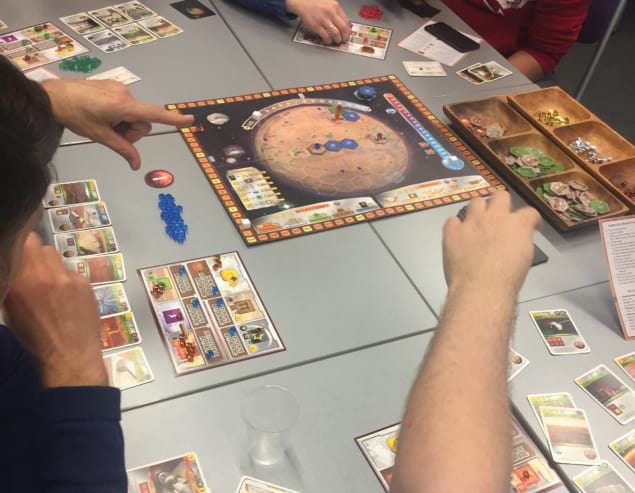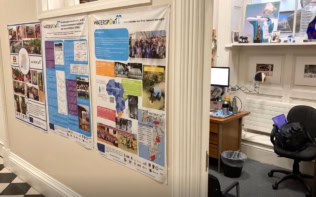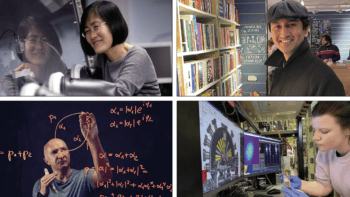Hannah Renshall argues that tabletop games can be a powerful tool to get more people interested in physics

Ask any scientist why they do science and they often say it’s because of a deep passion to learn and understand nature. Ask a scientist why they do outreach and usually the response is to inspire more young people into science. After all, what better way to inspire someone than by sharing your passion and knowledge?
But sometimes there can be disadvantages to scientist-led outreach. While scientists are very knowledgeable, they may not have the necessary skills to engage with some audiences. It can then be hard for them to simplify their work to a level that is inspiring, rather than perplexing. Those drawbacks can sadly be amplified for audiences that are most under-represented in science – such as those from low socio-economic backgrounds or those that live in geographically remote areas. These audiences may switch off when meeting a scientist, whom they assume cannot be related to as “someone like me” – instead assigning a stereotypical caricature.
Informal learning
While some scientists are indeed excellent communications, what if we could also use groups that have the same interest of raising career aspirations in science but already provide informal learning opportunities? I am thinking of staff at organisations supporting young homeless people and children from disadvantaged backgrounds, say, as well as librarians, activity organisers for semi-retired and retired people, and employment consultants from local chambers of commerce. How could we go about working with these people to engage their communities with aspirational activities and opportunities?
Sam Illingworth and Paul Wake, the co-directors of the Games Research Network at Manchester Metropolitan University, UK, suggest that one avenue is through tabletop games – anything played on a flat surface, such as a board game or card game. Such activities not only provide a highly effective way to engage different audiences with complex topics, but also offer the opportunity for further discussion and debate.
Such games, in addition, allow for shared social experiences and can be easily modified and adapted depending on the targeted audience. Given they are so flexible as a communication tool, we decided that they would provide the perfect platform to introduce community leaders to physics-based activities and opportunities that could be used with their audiences.
During a training session for community leaders that we ran on 1 December 2017 at Manchester Metropolitan University, four commercially available tabletop games were played: Math Fluxx, Women in Science, Lab Wars and Terraforming Mars. After playing each of these games, the organizers led a discussion about the pros and cons of each, exploring the ways in which they might be used to address key issues in physics and, more widely, within science.
For example, while Women in Science provided a wonderful opportunity to discuss the way that women have been perceived and continue to be perceived in science, Terraforming Mars prompted a more extended discussion of physics, climate change, wildlife conservation, and energy production. Playing as teams of two, participants enacted the role of powerful corporations vying for control of the red planet, experiencing some of the ethical and economic dilemmas associated with humankind’s plans to colonize other planets.
Following the success of the session, plans are now under way to implement tabletop games as a science communication tool by all of the community leaders. For example, Women in Science will be used at the Dukes Theatre in Lancaster, running a community project with an audience of young girls from the travelling community. Most girls from this community leave school at age seven or eight, so by also involving their parents in the activities we hope it will boost their children’s education and career aspirations. Terraforming Mars will feature in school-based projects across Cheshire in northern England led by the local chamber of commerce.
Of course, some people might be asking why we should bother doing this for audiences that might not traditionally see themselves as future scientists? For example, if young women in the travelling community have already left school, the chances of them returning and studying to be scientists might be slim. Would our efforts not be better spent with school students? We would argue not.
Supporting aspirations
The Institute of Physics, which publishes Physics World, also wants to work towards a society in which parents, grandparents and community leaders support a child’s aspirations in science. So raising the value of science in those audiences is important too. We are working with the University of the Third Age – an international organization to educate older members of the community – to support members to encourage their grandchildren’s science aspirations and in a similar session for parents with social-services involvement.
Overall, this work has led to non-scientists going away with the confidence and skills to inspire new audiences in science in a way that best works for them. We should do more of it.



